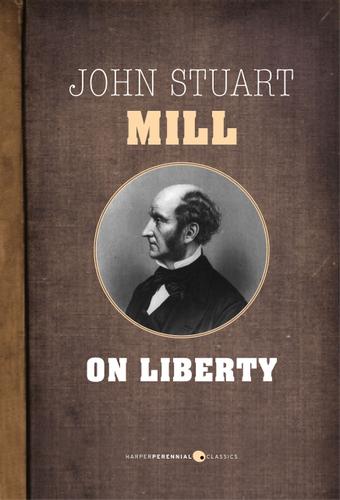Have you ever felt stifled, your voice unheard in a world that seems determined to impose its will? John Stuart Mill, a celebrated 19th-century philosopher, grappled with these very questions in his seminal work, “On Liberty.” This eloquent and enduring treatise explores the delicate balance between individual freedom and societal control. It poses a fundamental question: how do we ensure that societies flourish while respecting the autonomy of each individual?

Image: es.scribd.com
Mill’s “On Liberty” is not a dusty relic of a bygone era. Its timeless principles resonate with astonishing immediacy in today’s world, where digital surveillance, political polarization, and the very definition of liberty seem constantly challenged. This insightful PDF, accessible to all, invites us into a profound philosophical journey that explores the very essence of what it means to be free, not just in a legal sense, but in a truly humane and fulfilling way.
A Journey into the Heart of Individual Liberty
Mill’s “On Liberty” is not merely a manifesto of freedom, but a carefully crafted argument rooted in historical context and philosophical reasoning. It’s a book that invites you to think critically, to challenge assumptions, and to engage in profound introspection.
The Tyranny of the Majority
One of Mill’s most poignant arguments addresses the “tyranny of the majority.” This is not a brute force, but a subtle yet insidious form of oppression where prevailing social norms and expectations silence dissenting voices. Even without explicit coercion, individuals can find themselves pressured to conform, afraid to step outside the boundaries of what is deemed acceptable. Mill argues that this kind of silent tyranny is as dangerous as any authoritarian regime, as it stifles the very intellectual and moral growth that drives human progress.
The Freedom of Thought and Expression
Central to Mill’s philosophy is the unyielding belief in the freedom of thought and expression. He asserts that suppressing dissenting opinions, even those we find repugnant, is a grave error. His reasoning is both practical and philosophical. First, suppressing an opinion might be suppressing the truth. Second, even if the opinion is demonstrably wrong, the act of challenging it strengthens our understanding of truth and ensures the continued exploration of diverse perspectives.

Image: www.redshelf.com
The Limits of Liberty
While Mill champions individual freedom, he is not a naive optimist. He acknowledges that liberty must be tempered by responsibility. This is where his nuanced understanding of harm comes into play. He argues that an individual’s actions should be restricted only when they demonstrably cause harm to others. This harm principle, as it’s known, acts as a crucial boundary for the exercise of one’s liberty.
The Importance of Individuality
Mill deeply valued individuality, seeing it as the cornerstone of a flourishing society. He argued that conformity, while seeming safe and predictable, ultimately stymies the development of unique talents and perspectives. A society that values individuality fosters creativity, innovation, and a rich tapestry of human experience, enriching the lives of all its members.
The Role of Education and Self-Development
Mill believed that true liberty is not simply the absence of constraint but the ability to live a life of self-direction, guided by reason and wisdom. This, he argued, is achieved through education and continuous self-development. He envisioned individuals not as passive recipients of societal norms but as active participants in shaping their own destinies.
The Timeless Relevance of Mill’s Insights
“On Liberty” remains profoundly relevant in the modern age. We see echoes of Mill’s concerns in the rise of social media echo chambers, the constant pressure to conform to online trends, and the increasingly blurred lines between freedom of expression and hate speech.
Mill’s work calls on us to be vigilant, to critically examine social norms and political narratives, and to defend individual liberty not just as a right, but as a fundamental pillar of a just and prosperous society.
Actionable Insights for Your Life
Mill’s “On Liberty” is not just a philosophical treatise; it’s a call to action. Here are a few practical ways you can apply his principles to your own life:
- Be open to diverse viewpoints: Actively seek out perspectives that differ from your own. Engage in meaningful dialogue, challenge assumptions, and cultivate an intellectually curious mindset.
- Stand up for your beliefs: Don’t be afraid to voice your opinions, even if they are unpopular. Remember, your voice matters, and expressing yourself is integral to the free exchange of ideas.
- Be mindful of the harm principle: Consider the potential consequences of your actions and avoid causing needless harm to others.
On Liberty By John Stuart Mill Pdf
Conclusion
John Stuart Mill’s “On Liberty” is not simply a book; it is a legacy. It is a testament to the power of human thought and a timeless reminder of our responsibility to safeguard freedom, both for ourselves and for those around us. Read it, engage with its ideas, and let it fuel your journey towards a more just and fulfilling life.






